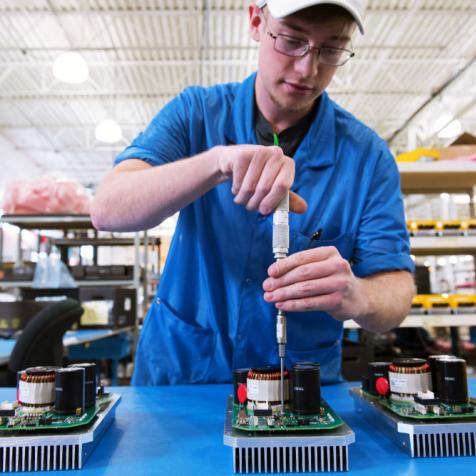
Company Details
Location
Boulder, Colorado
Founded
2013
Ownership Type
Private
Employees
12
Products
Solar control systems
Boulder, Colorado
Founded: 2013
Privately owned
Employees: 12
Industry: Energy & Enviro
Products: Solar control systems
CEO John LoPorto has taken his company from a vision to one of Colorado's solar energy leaders.
The company, SunTech Drive, was the 2013 creation of two engineers, Drs. Nikola Milivojevic and Yusum Gurkaynak, who shared ideas about the future when they worked at Southwest Windpower and Bright Energy Storage Technologies, both of Colorado. Milivojevic is now chief technology officer and Gurkaynak chief engineer of SunTech Drive.
They brought LoPorto onboard in 2015 and the company's fortunes took off. LoPorto, previously CEO of Navitus Power Services and Power Tagging, helped raise its first outside capital and ramped up manufacturing. In 2017, SunTech was recognized by the Colorado Cleantech Industries Association as the "Breakout Cleantech Company of the Year."

The recognition was largely due to SunTech Drive's successful market launch of its PicoCell product line, designed to bring intelligence to solar energy used in a wide range of applications, including water pumps, compressors, and fans. PicoCells are now used by customers in North and Latin America, Africa and Asia for livestock well pumping, oil and gas industrial water treatment and aquaculture pond aeration. The PicoCell commonly is used with solar power but, combined with SunTech Drive's Power Blending Controller, can integrate power from an electrical grid or diesel generator.
"We really focus on high-volume loads on the edge of the grid," LoPorto says. "We see a lot of interest in hybrids. We can reduce the operating costs by eliminating demand charges and time of use charges."

The PicoCell, he says, sits between the power source and the output, combining the intelligence previously offered by several separate devices to control how the energy is used. LoPorto says the PicoCell is akin to the video game console, which can be used to play video games built by a host of developers.
"Our box is similar," he says. "One box ships worldwide and it doesn't make a difference what motor is used. The power can grid can be variable," he says. "Our strategy is adaptive firmware instead of manufacturing dozens of variations."
An example of how the PicoCell is used is a dairy operation that uses fans to cool the cows when the animals' body temperatures rise beyond the ideal range. Typically, one fan is used to cool 20 cows and the U.S. has about 9 million dairy cows.

Dairies can save a lot of money if they can run the fans using solar power when its available and the power grid or diesel generators when necessary. The PicoCell also can adjust temperatures in different parts of a barn. "Our software makes it a lot simpler [to monitor and change temperatures]," says LoPorto.
SunTech Drive also is expanding its PicoCell product line to operate higher power levels necessary for applications like pump jacks in the oil and gas industry. These often use diesel generators. "We can provide a hybrid solution to dramatically reduce diesel fuel," LoPorto says.
While the PicoCell was designed as a standalone solar energy controller, it can be used with the company's Power Blending Controller to switch energy from solar to the electrical grid or diesel generation. This might occur when the sun isn't shining, when power isn't available from the grid or to save on the costs of grid power.

SunTech Drive doesn't manufacture the PicoCell products in-house, instead contracting with Premier Manufacturing of Frederick, one of Colorado's leading electronics manufacturers.
Although SunTech Drive's business focus is on commercial applications, LoPorto says the company also has demonstrated the PicoCell can be used to help developing countries that need clean energy and access to water. One example is a project in Bangladesh to provide water to residents of an area off the electrical grid. The Islamic Development Bank and the government of Bangladesh funded the project, which pumps water primarily using solar power. The project is using PicoCells because they save overall costs and can use virtually any pump.
Challenges: "At this point, just working up our distribution channels and our manufacturing logistics," LoPorto says.

Opportunities: "We're selling quite a bit into solar water pumping, [with] applications like livestock watering, crop irrigation and this summer with swimming pools," says LoPorto. "We're also moving into livestock cooling and toxic water evaporation ponds."
Needs: "We're going through rapid growth, so we need to bring in growth capital and move to larger facilities and ramp up manufacturing volume," says LoPorto.

